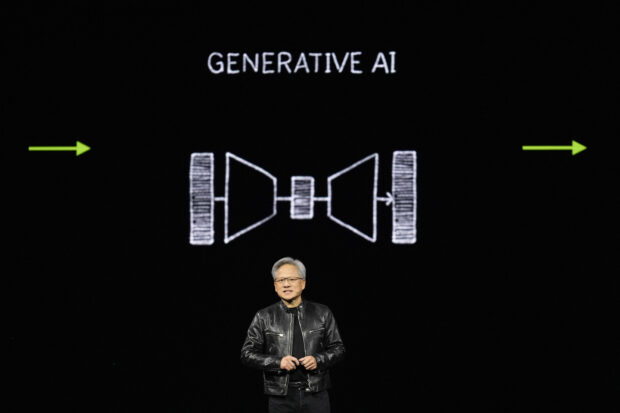
Nvidia CEO Jensen Huang makes the keynote address at Nvidia GTC in San Jose, Calif. on March 18, 2024. Nvidia reports earnings on Wednesday, May 22, 2024. (AP Photo/Eric Risberg)
SAN FRANCISCO — Nvidia on Wednesday overshot Wall Street estimates as its profit skyrocketed, bolstered by the chip-making dominance that has made the company an icon of the artificial intelligence boom.
Its net income rose more than sevenfold compared to a year earlier, jumping to $14.88 billion in its first quarter that ended April 28 from $2.04 billion a year earlier. Revenue more than tripled, rising to $26.04 billion from $7.19 billion in the previous year.
The company reported earnings per share adjusted to exclude one-time items of $6.12, well above the $5.60 Wall Street analysts had expected, according to FactSet.
It also announced a 10-for-1 stock split, a move that it noted will make its shares more accessible to employees and investors.
Nvidia likewise increased its dividend to 10 cents a share from 4 cents.
READ: Nvidia replaces Alphabet as Wall St’s third most valuable company
Shares in Nvidia Corp. rose more than 4 percent in after-hours trading to $991.85. The stock has risen more than 200 percent in the past year.
Early lead
The company, based in Santa Clara, California, carved out an early lead in the hardware and software needed to tailor its technology to AI applications, partly because founder and CEO Jensen Huang began to nudge the company into what was then seen as a still half-baked technology more than a decade ago. It also makes chips for gaming and cars.
The company now boasts the third-highest market value on Wall Street, behind only Microsoft and Apple.
“Nvidia defies gravity again,” said Jacob Bourne, an analyst with Emarketer, of the quarterly report. While many tech companies are eager to reduce their dependence on Nvidia, which has achieved a level of hardware dominance in AI rivaling that of earlier computing pioneers such as Intel Corp., “they’re not quite there yet,” he added.
Demand for generative AI systems that can compose documents, make images, and serve as increasingly lifelike personal assistants fueled astronomical sales of Nvidia’s specialized AI chips over the past year.
Tech giants Amazon, Google, Meta, and Microsoft have all signaled they will need to spend more in the coming months on the chips and data centers needed to train and operate their AI systems.